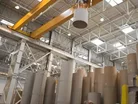Mondi: improving efficiency for a sustainable and digital future

With sustainability steadily becoming a top priority for many businesses, Mondi is leading the way in the paper and packaging industry
Mondi is split into three areas of business: consumer packaging, graphical paper and fibre packaging. 60% of the firm’s operations are commanded by the latter unit, which also dominates the company’s value chain. The CEO of Mondi’s Fibre Packaging business, Markus Gartner, reveals how his team’s operations span from wood to pulp and paper making, all the way to corrugated packaging and bag solutions. Gartner prioritises three key functions to ensure his business operates as strongly and effectively as possible. “Firstly, we are really good at running our assets efficiently, which you can see if you look at our profitability – we are by far the most profitable player in the industry,” he says. “Secondly, we have well-maintained assets; we are not a company that invests and runs the assets down, but instead we always try to maintain the latest technology in our plants. Finally, and most importantly, we have a very skilled workforce. Topics like lifelong learning are extremely important to us to maintain the skill level.”
Having previously worked in the aluminium industry, Gartner brings a wealth of operational experience to Mondi. “The way we look at performance and operations are very similar: the type of key performance indicators we look at and the role that efficiency plays is very similar in the aluminium rolling industry as it is in the paper industry,” he says. However, Gartner enthuses, Mondi’s approach to sustainability is far more advanced: “The level at which we can offer sustainable products and solutions is far more progressive than I’ve seen in my previous industry. You see that reflected in how our organisation is set up – sustainability is really something that touches every aspect of our operations and our commercial thinking.”
As an aspect that covers all of the firm’s value chain, sustainability is at the core of Mondi’s values. For instance, the firm ensures it responsibly sources materials such as wood. “When it comes to wood procurement, 71% of our wood is procured from FSC certified sources, with the rest controlled by our high sustainability standards. We can, therefore, say that 100% of our wood resources are sustainable and that’s very important to us,” notes Gartner. The company also aims to keep its carbon footprint as low as possible, targeting energy generation to do so. “If you picture a large pulp and paper mill, it is a huge plant that consumes a lot of energy for its processes. However, there are several renewable residues – the bark and the wood that is not used for the pulping process – which can be used to generate energy. All of Mondi’s pulp mills and larger partners are completely energy self-sufficient. We generate all the energy we need and more, selling the excess to national grids as electricity,” he adds.
Gartner argues that sustainability is becoming more critical as urbanisation extends: “As more people live in cities, they are requiring totally different packaging needs. It also increases the needs of sustainability because people are living in confined spaces – we cannot generate as much rubbish as before.” Mondi’s connection to the fast-moving consumer goods (FMCG) market is helping to drive sustainability. “We see a huge benefit in combining these two strengths: having a sustainable product offering and speaking the language of FMCG companies. Mondi calls that the ‘internally equal solutions’ – we aim to create more sustainable solutions for products that are less sustainable today. The benefit really comes from connecting the dots within the company, and it has brought us immense success already so far,” he adds.
Another integral aspect of the firm’s operations is digital transformation. “A lot of companies perceive ‘going digital’ as just increasing the level of automation. In my opinion, that’s not what it is about,” explains Gartner. “Digital is two things: it is applying advanced analytics, which is a new methodology that we haven't used in manufacturing and heavy industries before, and it is a new way of working.” He argues that technology has to be introduced in stages – with efficiency improvement programmes bein integrated into sprints a couple of weeks at a time – to be effective. The company is currently seeking to make use of the vast sources of data within its operations. In a pulp and paper mill, Mondi has implemented between 40,000 and 60,000 sensors that capture live data from the production process. “We are using various advanced analytics software tools as well as methodologies to look across the processes and steps of our value chain to generate insights. For instance, how does a boiler status evolve over time? Can we predict what the boiler’s status is in half an hour and then address the different parameter settings already to avoid any critical states?”
As Mondi continues on its journey to a more sustainable and digital future, its focus on efficiency is continuing to drive growth. “A lot of companies would say that the most prominent benefit of digital transformation is real efficiency improvement. This is no different for us,” comments Gartner. However, safety is also a crucial aspect to innovation for the firm. “There is more to it than efficiency – we have incorporated technology in the production process to make it safer to operate. Now with digital technology, we can predict breakages in the paper machines and avoid them before they happen.” The company is committed to ensuring the wellbeing of its team, which will undoubtedly lead them to a strong, secure future.

